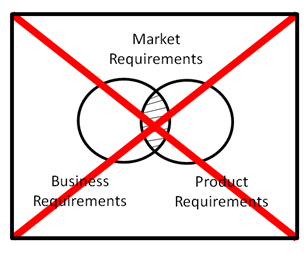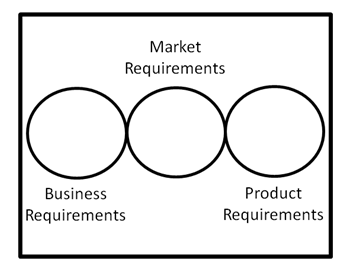Val Workman
The opinions expressed by the bloggers below and those providing comments are theirs alone, and do not necessarily reflect the opinions of Ryma Technology Solutions. As they say, you can't innovate without breaking a few eggs...
- Font size: Larger Smaller
- Hits: 34177
- 3 Comments
- Subscribe to this entry
- Bookmark
The Difference Between Business, Market, and Product Requirements
To download Ryma's Guide to Building Business Cases MRDs and PRDs, click here.
Boy, I don't know anything that causes more miscommunication in product management than when we say "requirements" instead of "market requirements". You'd think that the context would be enough to clarify what is meant, but it's not. It turns out there're lots of different types of requirements, and the product management team is involved with most of them. To keep this post uncluttered and focused, I'm going to be addressing the market requirement.
The market requirement is a specialized hybrid of a product-centric business requirement and a market centric product requirement. By this I mean that market requirements constrain the product in terms of business demands. The market requirement puts boundaries on what the product should and should not do in order to meet business needs like producing wider margins, maintaining competency alignment, leveraging existing resources, and building customer satisfaction.
Market requirements also constrain the market in terms of the product. The market requirement indicates what the market can or can't expect from the product. This sets the market's perceived value of the product. If the perceived value is low, you adjust it with a different set of market requirements. I'll come back to this concept further down in this posting.
So the question becomes; "Is the market requirement just a business requirement that has been extended to focus more on the product, or is it a product requirement that has been extended to focus more on the market?". This notion can be expressed in the Venn diagram of two requirement sets, the product requirements and the market requirements, where the intersection of the two sets is referred to as market requirements. This popular belief is false.

Here's why the intersection theory is incorrect. A market requirement cannot be just a market centric product requirement, because the market requirement doesn’t describe physical properties of a system or product as all product requirements must. In fact, a market requirement must not address any specific product implementation, it just specifies what that product must do or be to achieve a certain level of customer satisfaction. Physical properties are the domain of product requirements, not market requirements.
It's true that the market requirement is like a product centric business requirement since it describes in business terms what must be delivered or accomplished to provide value to the market. However, business requirements are normally processes and business activity centric, and the Market Requirement is not, it is centered around product, thus cannot be a business requirement.
The result becomes clear, we in fact have three disjoint and exclusive sets of requirements.

The market requirement is also similar to a business requirement in that many times it may encompass pre-requisites for functional and non-functional requirements. However, the market requirement would state these pre-requisites in terms of the product not a process or activity as the business requirement would.
Also like the business requirement, the market requirement is stated in an inward-facing voice to development as opposed to an outward facing voice like a product feature. However, unlike the business requirement which is communicating how a new or existing business process should work, the market requirement is stating what the intended user needs to receive from the product in order to gain the targeted level of customer satisfaction.
Comments
-
 Sunday, 08 April 2012
Sunday, 08 April 2012Brett, business requirements would include things like the need for 'using business partner X', or 'must use inventory lot Y'. Business requirements include things like specific processes that need to be followed. A common business requirement of this type are required quality gates. Many times business constraints also are grouped into this requirement pool. This would be things like, 'must not exceed 200 hrs of development time'.
Notice, none of these things refer to what the market needs, they're all about what your organization needs. Many times, Business requirements are referred to as the internal requirements, and Market Requirements the external. This type of thinking aligns nicely with opportunity analysis methods, where both internal and external forces are evaluated.
Market requirements, or external requirements are what your organization must do to maintain or increase customer satisfaction. A market requirement could be, 'The car should be able to carry at least four adults.' A related business requirement would be, 'A new product-line should be developed for passenger cars carrying more than two adults.'
Hope this helps.









This makes sense, I think. I agree that market requirements are very different from product requirements. However, I'm not as clear on the difference between business requirements and market requirements. Could you provide a couple examples?